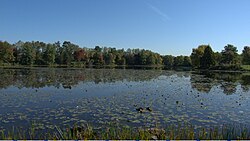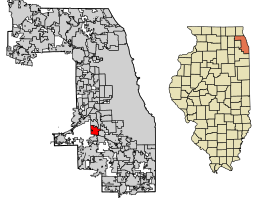Palos Hills, Illinois
Palos Hills, Illinois | |
|---|---|
City | |
| City of Palos Hills | |
 Park in Palos Hills, Illinois | |
| Motto: "Pride In Progress" | |
 Location of Palos Hills in Cook County, Illinois. | |
 Location of Illinois in the United States | |
| Coordinates: 41°41′57″N 87°49′35″W / 41.69917°N 87.82639°W | |
| Country | United States |
| State | Illinois |
| County | Cook |
| Township | Palos |
| Incorporated | 1958 |
| Government | |
| • Type | Mayor–council |
| • Mayor | Gerald Bennett |
| Area | |
| • Total | 4.29 sq mi (11.11 km2) |
| • Land | 4.25 sq mi (11.00 km2) |
| • Water | 0.04 sq mi (0.11 km2) 0.93% |
| Population (2020) | |
| • Total | 18,530 |
| • Density | 4,364.11/sq mi (1,684.87/km2) |
| Standard of living (2007-11) | |
| • Per capita income | $29,783 |
| • Median home value | $223,200 |
| ZIP code(s) | 60465 |
| Area code(s) | 708 |
| Geocode | 57394 |
| FIPS code | 17-57394 |
| Website | www |
Palos Hills is a city in Cook County, Illinois, United States. It is a southwest suburb of Chicago. The city was established in 1958 and had reached a population of 18,530 in the 2020 census.[2] It is named after Palos de la Frontera, Spain,[citation needed] from which Christopher Columbus set sail to North America. Moraine Valley Community College as and Amos Alonzo Stagg High School are its main schools.
Geography
[edit]According to the 2021 census gazetteer files, Palos Hills has a total area of 4.29 square miles (11.11 km2), of which 4.25 square miles (11.01 km2) (or 98.97%) is land and 0.04 square miles (0.10 km2) (or 1.03%) is water.[3]
Demographics
[edit]| Census | Pop. | Note | %± |
|---|---|---|---|
| 1960 | 3,766 | — | |
| 1970 | 6,629 | 76.0% | |
| 1980 | 16,654 | 151.2% | |
| 1990 | 17,803 | 6.9% | |
| 2000 | 17,665 | −0.8% | |
| 2010 | 17,484 | −1.0% | |
| 2020 | 18,530 | 6.0% | |
| U.S. Decennial Census[4] 2010[5] 2020[6] | |||
As of the 2020 census[7] there were 18,530 people, 7,247 households, and 4,209 families residing in the city. The population density was 4,319.35 inhabitants per square mile (1,667.71/km2). There were 7,697 housing units at an average density of 1,794.17 per square mile (692.73/km2). The racial makeup of the city was 81.70% White, 5.77% African American, 0.18% Native American, 2.17% Asian, 0.01% Pacific Islander, 3.39% from other races, and 6.77% from two or more races. Hispanic or Latino of any race were 10.19% of the population.
The top reported ancestries as of 2020 where Polish (29.3%), German (12.7%), Irish (12.6%), Arab (9.6%), and Italian (8.3%).
There were 7,247 households, out of which 22.4% had children under the age of 18 living with them, 43.63% were married couples living together, 10.17% had a female householder with no husband present, and 41.92% were non-families. 36.35% of all households were made up of individuals, and 17.01% had someone living alone who was 65 years of age or older. The average household size was 3.17 and the average family size was 2.34.
The city's age distribution consisted of 18.1% under the age of 18, 8.2% from 18 to 24, 24.5% from 25 to 44, 27.5% from 45 to 64, and 21.8% who were 65 years of age or older. The median age was 44.6 years. For every 100 females, there were 83.3 males. For every 100 females age 18 and over, there were 77.3 males.
The median income for a household in the city was $64,364, and the median income for a family was $81,045. Males had a median income of $57,339 versus $37,926 for females. The per capita income for the city was $34,564. About 9.3% of families and 12.0% of the population were below the poverty line, including 15.1% of those under age 18 and 11.6% of those age 65 or over.
| Race / Ethnicity (NH = Non-Hispanic) | Pop 2000[8] | Pop 2010[5] | Pop 2020[6] | % 2000 | % 2010 | % 2020 |
|---|---|---|---|---|---|---|
| White alone (NH) | 14,897 | 14,591 | 14,729 | 84.33% | 83.45% | 79.49% |
| Black or African American alone (NH) | 960 | 926 | 1,040 | 5.43% | 5.30% | 5.61% |
| Native American or Alaska Native alone (NH) | 12 | 14 | 9 | 0.07% | 0.08% | 0.05% |
| Asian alone (NH) | 468 | 450 | 392 | 2.65% | 2.57% | 2.12% |
| Pacific Islander alone (NH) | 2 | 4 | 0 | 0.01% | 0.02% | 0.00% |
| Other race alone (NH) | 19 | 14 | 85 | 0.11% | 0.00% | 0.46% |
| Mixed race or Multiracial (NH) | 453 | 193 | 386 | 2.56% | 1.10% | 2.08% |
| Hispanic or Latino (any race) | 854 | 1,292 | 1,889 | 4.83% | 7.39% | 10.19% |
| Total | 17,665 | 17,484 | 18,530 | 100.00% | 100.00% | 100.00% |
Government
[edit]Palos Hills is in Illinois's 3rd congressional district.
The City of Palos Hills operates under a Mayor/Council form of government with a Mayor, Clerk and City Treasurer elected at large and 10 Aldermen elected from 5 dual member wards.
- Mayor Gerald R. Bennett
- City Clerk Rudy Mulderink
- City Treasurer Kenneth Nolan.
Aldermen:
- Ward 1: Martin Kleefisch and Michael Price
- Ward 2: Pauline Stratton and Mark Brachman
- Ward 3: A.J. Pasek and Michael Lebarre
- Ward 4: Joseph Marrotta and Phil Abed
- Ward 5: Dawn Nowak and Donna O'Connel [9]
North Palos Fire Protection District operates Station 1 and Station 2 in Palos Hills.[10][11]
Education
[edit]Elementary school districts serving Palos Hills:[12]
- North Palos School District 117
- Palos School District 118
- All sections are zoned to Palos South Middle School in Palos Park. Currently sections of Palos Hills in District 118 are divided between Palos East Elementary in Palos Heights and Palos West Elementary in Palos Park. Prior to 2016-2017 all of the District 118 portion of Palos Hills was in the Palos East zone.[13]
Amos Alonzo Stagg High School of the Consolidated High School District 230 serves Palos Hills.[14]
Moraine Valley Community College is the area community college.
Transportation
[edit]Pace provides bus service on multiple routes connecting Palos Hills to destinations across the Southland.[15]
Notable people
[edit]- Nick Drnaso
- Christian Dvorak, professional ice hockey player
- Matthew Haag
- T. J. McFarland, professional baseball pitcher
- Herb Schumann, former Cook County commissioner[16]
- Ben Skora
References
[edit]- ^ "2020 U.S. Gazetteer Files". United States Census Bureau. Retrieved March 15, 2022.
- ^ "Palos Hills city, Illinois". United States Census Bureau. Retrieved April 15, 2022.
- ^ Bureau, US Census. "Gazetteer Files". Census.gov. Retrieved June 29, 2022.
{{cite web}}:|last=has generic name (help) - ^ "Decennial Census of Population and Housing by Decades". US Census Bureau.
- ^ a b "P2 Hispanic or Latino, and Not Hispanic or Latino by Race – 2010: DEC Redistricting Data (PL 94-171) – Palos Hills city, Illinois". United States Census Bureau.
- ^ a b "P2 Hispanic or Latino, and Not Hispanic or Latino by Race – 2020: DEC Redistricting Data (PL 94-171) – Palos Hills city, Illinois". United States Census Bureau.
- ^ "Explore Census Data". data.census.gov. Retrieved June 28, 2022.
- ^ "P004: Hispanic or Latino, and Not Hispanic or Latino by Race – 2000: DEC Summary File 1 – Palos Hills city, Illinois". United States Census Bureau. Retrieved January 26, 2024.
- ^ "Government". City of Palos Hills.
- ^ "Station 1." North Palos Fire Protection District. Retrieved on January 20, 2017. "10629 So. Roberts Rd. Palos Hills, IL 60465"
- ^ "Station 2." North Palos Fire Protection District. Retrieved on January 20, 2017. "8913 W. 95th St. Palos Hills, IL 60465"
- ^ "2020 CENSUS - SCHOOL DISTRICT REFERENCE MAP: Cook County, IL" (PDF). U.S. Census Bureau. p. 9 (PDF p. 10/13). Retrieved September 18, 2024. - Text list
- ^ "Boundary Change Presentation Archived February 2, 2017, at the Wayback Machine." Palos School District 118. Retrieved on January 20, 2017. p. 6-8/12.
- ^ "Attendance Areas Archived February 2, 2017, at the Wayback Machine." Consolidated High School District 230. Retrieved on January 19, 2017.
- ^ "RTA System Map" (PDF). Retrieved January 30, 2024.
- ^ Galica, Larry (November 8, 1990). "Familiar faces return to Cook County Board". nwitimes.com. The Times of Northwest Indiana. Retrieved November 21, 2020.
Further reading
[edit]- "History of Palos Hills" (PDF). Published by City of Palos Hills. Retrieved April 21, 2018.


